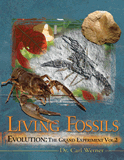
Rapid Speciation of Fish New Evidence For Evolution
Evolution observed in nature—again! Will it convince us this time?
News Source
On a somewhat regular basis, we read reports that scientists have observed evolution in action—right before their very eyes! Time and time again, reading beyond the headline reveals that “devolution” might be the better word: the observed organism is losing genetic information as natural selection preserves certain genes and eliminates others as species interact with their environments. Losing such genetic information in creatures is the opposite of molecules-to-man evolution.
Cichlid speciation occurs when changes in how they see leads to changes in mate selection.
So what about the new cover-story study published in a recent issue of the journal Nature—might it include a more compelling account of Darwinian evolution?
The study reported on the rapid speciation of cichlid species of fish in Lake Victoria (in central Africa). Lake Victoria holds more than 500 cichlid species, which “play a leading role because of their rapid speciation and remarkable diversity,” PhysOrg reports. According to the study, cichlid speciation occurs when changes in how they see leads to changes in mate selection. This is surprising, since the most common mechanism for speciation begins when populations become geographically isolated and adapt to different environmental conditions.
In the case of the cichlids, however, the difference is one of perception. It seems that red light penetrates deeper into Lake Victoria’s murky waters than blue light. Not coincidentally, male fish in shallow waters tend to be green or blue, whereas in deeper waters, the males are a brilliant red.
“These fish specialized to different microhabitats,” explained the University of Maryland’s Karen Carleton, one of the study team members. “The visual system then specialized to the light environment at these depths and the mating colors shifted to match. Once this happened, these two groups no longer interbred and so became new species.”
In other words, one cichlid species that likely could see both types of light and included all of the possible colors has “evolved” (speciated) into separate species whose senses are limited and who only exhibit certain colors. So as usual, rather than a case of information-adding evolution (which is required for the molecules-to-man narrative of Darwinism), this is just another observation of natural selection weeding out information as speciation occurs, resulting in organisms that are custom-tailored to their environment but lack the genetic diversity their ancestors had.
Very interesting is that much of Carleton’s research on the role of animal sensing in speciation is to be presented at the University of Maryland’s Bioscience Research and Technology Review Day (coming next month), part of the university’s ongoing celebration of the 200th anniversary of Charles Darwin’s birth.
Further Reading
- Hasn’t Evolution Been Proven True?
- Is Natural Selection the Same Thing as Evolution?
- Couldn’t God Have Used Evolution?
- Natural Selection vs. Evolution
For More Information: Get Answers
Remember, if you see a news story that might merit some attention, let us know about it! (Note: if the story originates from the Associated Press, FOX News, MSNBC, the New York Times, or another major national media outlet, we will most likely have already heard about it.) And thanks to all of our readers who have submitted great news tips to us. If you didn’t catch all the latest News to Know, why not take a look to see what you’ve missed?
(Please note that links will take you directly to the source. Answers in Genesis is not responsible for content on the websites to which we refer. For more information, please see our Privacy Policy.)
Recommended Resources

Answers in Genesis is an apologetics ministry, dedicated to helping Christians defend their faith and proclaim the good news of Jesus Christ.
- Customer Service 800.778.3390
- © 2024 Answers in Genesis



